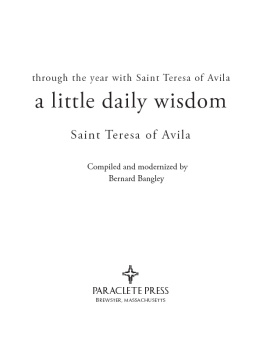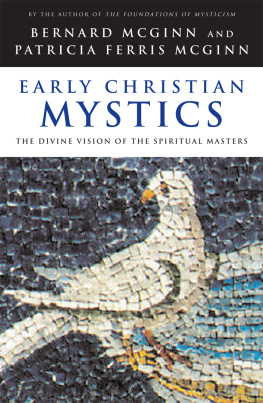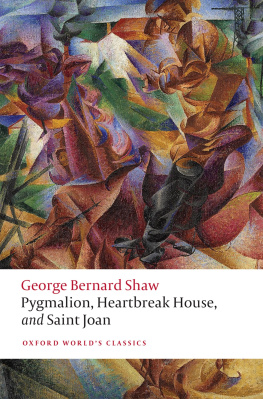Saint Bernard of Clairvaux - Saint Bernard of Clairvaux Collection
Here you can read online Saint Bernard of Clairvaux - Saint Bernard of Clairvaux Collection full text of the book (entire story) in english for free. Download pdf and epub, get meaning, cover and reviews about this ebook. year: 2016, publisher: Aeterna Press, genre: Religion. Description of the work, (preface) as well as reviews are available. Best literature library LitArk.com created for fans of good reading and offers a wide selection of genres:
Romance novel
Science fiction
Adventure
Detective
Science
History
Home and family
Prose
Art
Politics
Computer
Non-fiction
Religion
Business
Children
Humor
Choose a favorite category and find really read worthwhile books. Enjoy immersion in the world of imagination, feel the emotions of the characters or learn something new for yourself, make an fascinating discovery.
- Book:Saint Bernard of Clairvaux Collection
- Author:
- Publisher:Aeterna Press
- Genre:
- Year:2016
- Rating:5 / 5
- Favourites:Add to favourites
- Your mark:
- 100
- 1
- 2
- 3
- 4
- 5
Saint Bernard of Clairvaux Collection: summary, description and annotation
We offer to read an annotation, description, summary or preface (depends on what the author of the book "Saint Bernard of Clairvaux Collection" wrote himself). If you haven't found the necessary information about the book — write in the comments, we will try to find it.
Saint Bernard of Clairvaux Collection — read online for free the complete book (whole text) full work
Below is the text of the book, divided by pages. System saving the place of the last page read, allows you to conveniently read the book "Saint Bernard of Clairvaux Collection" online for free, without having to search again every time where you left off. Put a bookmark, and you can go to the page where you finished reading at any time.
Font size:
Interval:
Bookmark:
SAINT BERNARD
OF CLAIRVAUX
COLLECTION
9 BOOKS
COPYRIGHT 2016 BY AETERNA PRESS.
ALL RIGHTS RESERVED.
PUBLISHED BY AETERNA PRESS.
COVER DESIGN BY AETERNA PRESS.
KINDLE E-BOOK:
EISBN-13: 978-1-78647-146-8
WEBSITE
WWW.AETERNAPRESS.COM
BOOKS INDEX
SAINT BERNARD OF CLAIRVAUX COLLECTION
Bernard of Clairvaux, was a French abbot and the primary reformer for the Cistercian order. After the death of his mother, Bernard sought admission into the Cistercian order. "Three years later, he was sent to found a new abbey at an isolated clearing in a glen known as the Val d'Absinthe, about 15 kilometres (9.3 mi) southeast of Bar-sur-Aube. According to tradition, Bernard founded the monastery on 25 June 1115, naming it Claire Valle, which evolved into Clairvaux. There Bernard would preach an immediate faith, in which the intercessor was the Virgin Mary." In the year 1128, Bernard attended the Council of Troyes, at which he traced the outlines of the Rule of the Knights Templar, which soon became the ideal of Christian nobility. On the death of Pope Honorius II on 13 February 1130, a schism broke out in the Church. King Louis VI of France convened a national council of the French bishops at tampes in 1130, and Bernard was chosen to judge between the rivals for pope. After the council of tampes, Bernard spoke with King Henry I of England, also known as Henry Beauclerc, about Henry I's reservations regarding Pope Innocent II. Henry I was sceptical because most of the bishops of England supported Antipope Anacletus II; Bernard persuaded him to support Innocent. Germany had decided to support Innocent through Norbert of Xanten, who was a friend of Bernard's. However, Innocent insisted on Bernard's company when he met with Lothair II, Holy Roman Emperor.
COMMENTARY ON
THE SONG OF SONGS
SAINT BERNARD OF CLAIRVAUX
COPYRIGHT 2015 BY AETERNA PRESS.
ALL RIGHTS RESERVED.
AVAILABLE IN PAPERBACK.
ETEXT ARRANGED BY BR SEAN, A CHOIR MONK, 2008
CONTENTS
COMMENTARY ON THE SONG OF SONGS
SERMON 1
ON THE TITLE OF THE BOOK
The instructions that I address to you, my brothers, will differ from those I should deliver to people in the world, at least the manner will be different. The preacher who desires to follow St Pauls method of teaching will give them milk to drink rather than solid food, and will serve a more nourishing diet to those who are spiritually enlightened: We teach, he said, not in the way philosophy is taught, but in the way that the Spirit teaches us: we teach spiritual things spiritually. And again: We have a wisdom to offer those who have reached maturity, in whose company, I feel assured, you are to be found, unless in vain have you prolonged your study of divine teaching, mortified your senses, and meditated day and night on Gods law. Be ready then to feed on bread rather than milk. Solomon has bread to give that is splendid and delicious, the bread of that book called The Song of Songs. Let us bring it forth then if you please, and break it.
2. Now, unless I am mistaken, by the grace of God you have understood quite well from the book of Ecclesiastes how to recognize and have done with the false promise of this world. And then the book of Proverbs - has not your life and your conduct been sufficiently amended and enlightened by the doctrine it inculcates ? These are two loaves of which it has been your pleasure to taste, loaves you have welcomed as coming from the cupboard of a friend. Now approach for this third loaf that, if possible, you may always recognize what is best. Since there are two evils that comprise the only, or at least the main, enemies of the soul: a misguided love of the world and an excessive love of self, the two books previously mentioned can provide an antidote to each of these infections. One uproots pernicious habits of mind and body with the hoe of self-control. The other, by the use of enlightened reason, quickly perceives a delusive tinge in all that the world holds glorious, truly distinguishing between it and deeper truth. Moreover, it causes the fear of God and the observance of his commandments to be preferred to all human pursuits and worldly desires. And rightly so, for the former is the beginning of wisdom, the latter its culmination, for there is no true and consummate wisdom other than the avoidance of evil and the doing of good, no one can successfully shun evil without the fear of God, and no work is good without the observance of the commandments.
3. Taking it then these two evils have been warded off by the reading of choice books, we may suitably proceed with this holy and contemplative discourse which, as the fruit of the other two, may be delivered only to well prepared ears and minds.
Before the flesh has been tamed and the spirit set free by zeal for truth, before the worlds glamour and entanglements have been firmly repudiated, it is a rash enterprise on any mans part to presume to study spiritual doctrines. Just as a light is flashed in vain on closed or sightless eyes, so an unspiritual person cannot accept anything of the Spirit of God. For the Holy Spirit of instruction shuns what is false, and that is what the life of the intemperate man is. Nor will he ever have a part with the pretensions of the world, since he is the Spirit of Truth. How can there be harmony between the wisdom that comes down from above and the wisdom of the world, which is foolishness to God, or the wisdom of the flesh which is at enmity with God? I am sure that the friend who comes to us on his travels will have no reason to murmur against us after he has shared in this third loaf.
4. But who is going to divide this loaf? The Master of the house is present, it is the Lord you must see in the breaking of the bread. For who else could more fittingly do it ? It is a task that I would not dare to arrogate to myself. So look upon me as one from whom you look for nothing. For I myself am one of the seekers, one who begs along with you for the food of my soul, the nourishment of my spirit. Poor and needy, I knock at that door of his which, when he opens, nobody can close, that I may find light on the profound mystery to which this discourse leads. Patiently all creatures look to you, O Lord. Little children go begging for bread; no one spares a scrap for them; they await it from your merciful love. O God most kind, break your bread for this hungering flock, through my hands indeed if it should please you, but with an efficacy that is all your own.
5. Tell us, I beg you, by whom, about whom and to whom it is said: Let him kiss me with the kiss of his mouth. How shall I explain so abrupt a beginning, this sudden irruption as from a speech in mid-course? For the words spring upon us as if indicating one speaker to whom another is replying as she demands a kiss whoever she may be. But if she asks for or demands a kiss from somebody, why does she distinctly and expressly say with the mouth, and even with his own mouth, as if lovers should kiss by means other than the mouth, or with mouths other than their own ? But yet she does not say: Let him kiss me with his mouth; what she says is still more intimate: with the kiss of his mouth. How delightful a ploy of speech this, prompted into life by the kiss, with Scriptures own engaging countenance inspiring the reader and enticing him on, that he may find pleasure even in the laborious pursuit of what lies hidden, with a fascinating theme to sweeten the fatigue of research. Surely this mode of beginning that is not a beginning, this novelty of diction in a book so old, cannot but increase the readers attention. It must follow too that this work was composed, not by any human skill but by the artistry of the Spirit, difficult to understand indeed but yet enticing one to investigate.
6. So now what shall we do? Shall we by-pass the title? No, not even one iota may be omitted, since we are commanded to gather up the tiniest fragments lest they be lost. The title runs: The beginning of Solomons Song of Songs. First of all take note of the appropriateness of the name Peaceful, that is, Solomon, at the head of a book which opens with the token of peace, with a kiss. Take note too that by this kind of opening only men of peaceful minds, men who can achieve mastery over the turmoil of the passions and the distracting burden of daily chores, are invited to the study of this book.
Next pageFont size:
Interval:
Bookmark:
Similar books «Saint Bernard of Clairvaux Collection»
Look at similar books to Saint Bernard of Clairvaux Collection. We have selected literature similar in name and meaning in the hope of providing readers with more options to find new, interesting, not yet read works.
Discussion, reviews of the book Saint Bernard of Clairvaux Collection and just readers' own opinions. Leave your comments, write what you think about the work, its meaning or the main characters. Specify what exactly you liked and what you didn't like, and why you think so.











